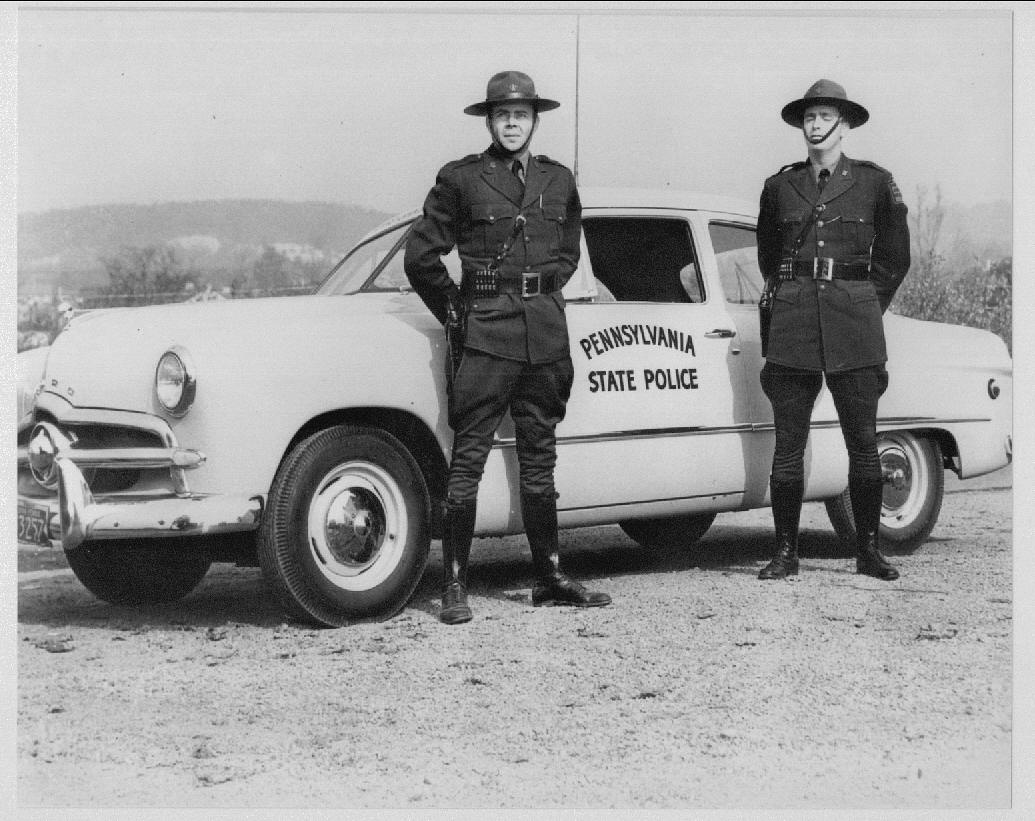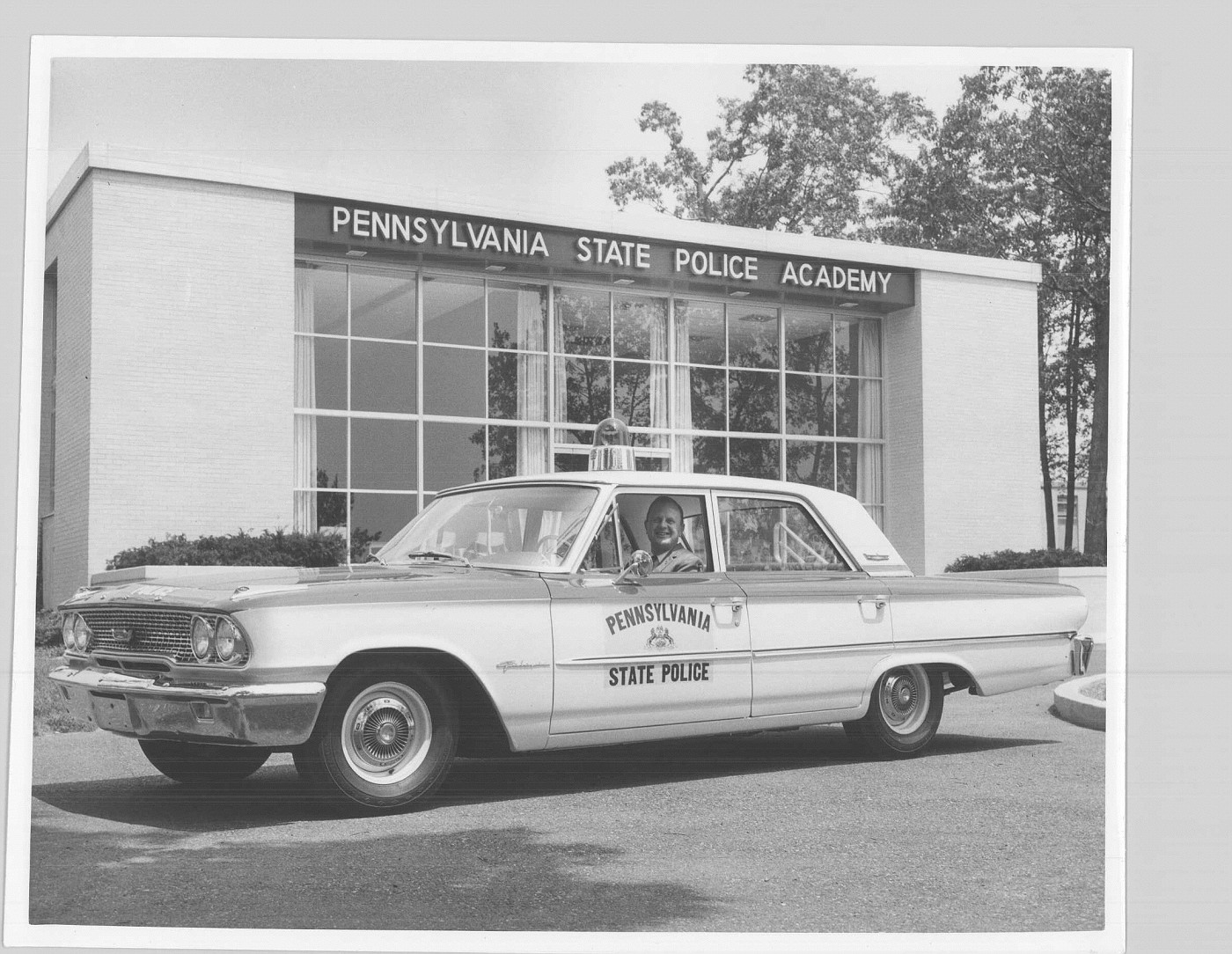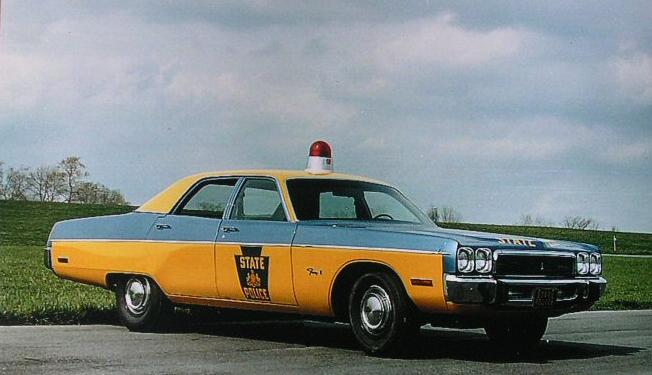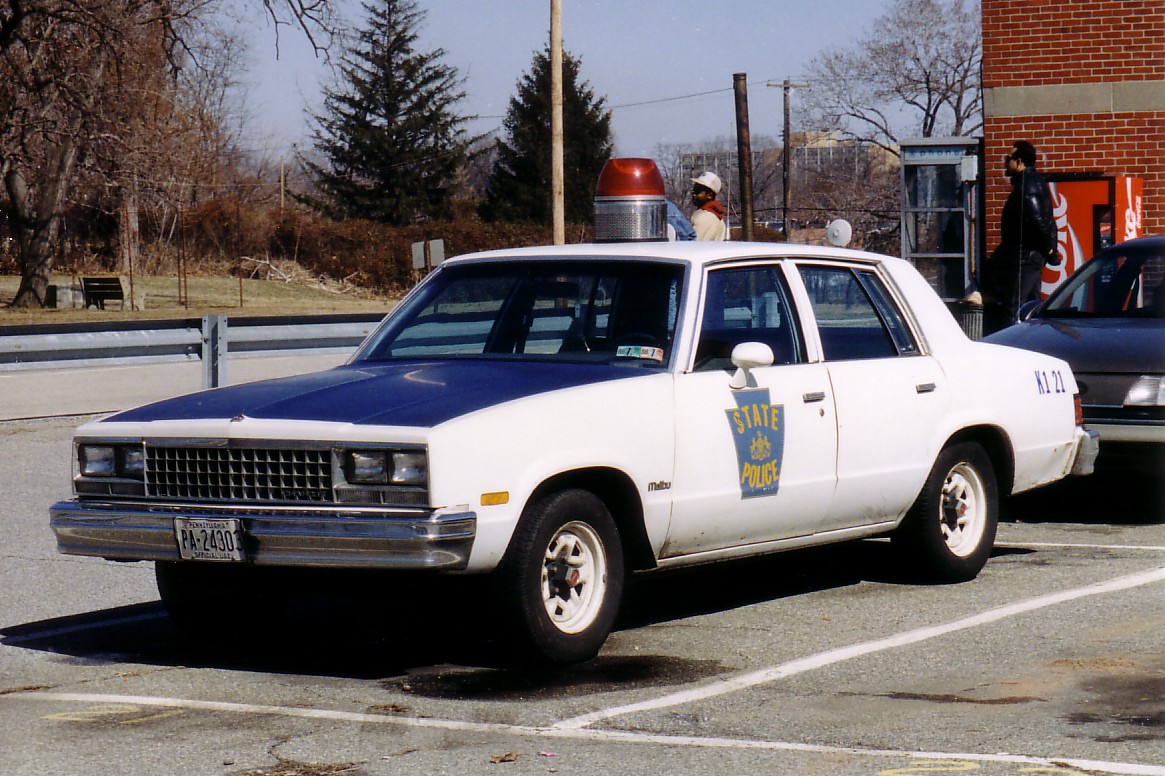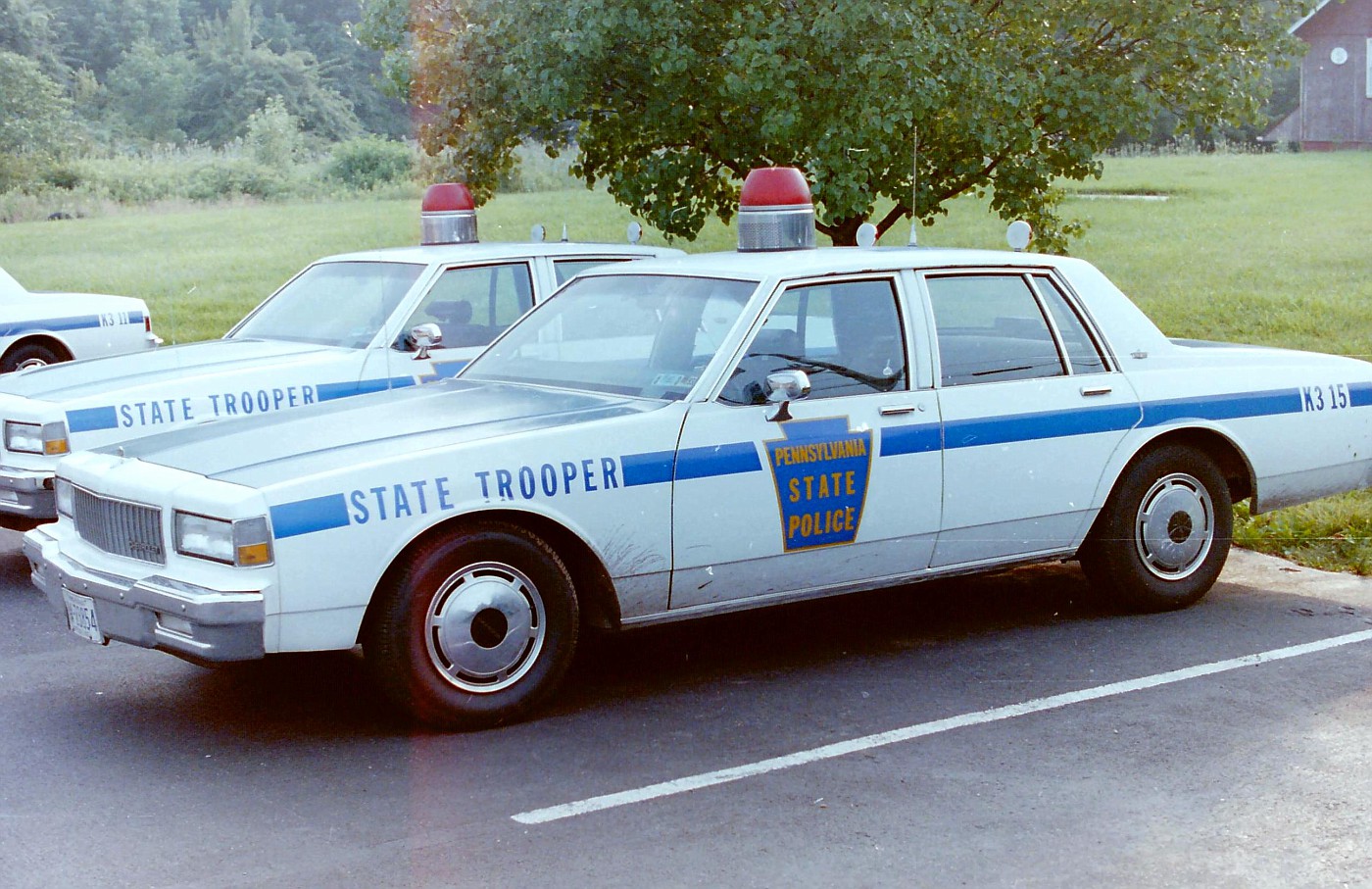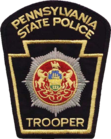
The Pennsylvania State Police (PSP) is the state police force of Pennsylvania, responsible for statewide law enforcement. It was founded in 1905 by order ofGovernor Samuel Pennypacker, in response to the private police forces used by mine and mill owners to stop worker strikes (the Coal and Iron Police) and the inability or refusal of local police or sheriffs offices to enforce the law. PSP enlisted members are referred to as "troopers". As of 2011, it has 4,677 state troopers and more than 1,600 civilian support staff. The state police academy is located in Hershey, Pennsylvania.
Duties
The PSP's duties include patrolling all state and federal highways across Pennsylvania, enforcing the Pennsylvania Vehicle Code, overseeing the state's automobile inspection program, enforcing the state's commercial vehicle safety regulations, and providing the full range of police protection for municipalities without full-time local police departments. The PSP patrols more than half of the state's 2,565 municipalities and the bulk of its rural areas, as the sheriffs in Pennsylvania have traditionally performed their court related services and only over the last several decades have begun to exercise their common law authority to enforce state law.
The PSP provides primary service for 27% of the Commonwealth's population, accounting for over 60% of the Commonwealth municipalities.
This constitutes 85% of the Commonwealth's land area and 66% of the Commonwealth's highways. This is accomplished with only 19% of the police officers in the Commonwealth.
The PSP's Bureau of Forensic Services provides crime lab services for criminal investigations. A special unit of the PSP act as bodyguards for the Governor of Pennsylvania and certain other state officials. The PSP also temporarily patrolled the state's 28 airports and five nuclear power plants in the months following the 9/11 attacks. However, the PSP still conducts security checks of all of the Delaware River Bridges along the PA/NJ border, in agreement with the Delaware River Joint Toll Bridge Commission.
The PSP administers the Pennsylvania Instant Check System (PICS), which is responsible for providing background checks in firearms purchases statewide. The PSP are embroiled in a controversy concerning the maintaining of a firearms "registry" contrary to both Federal and State laws[who?]. The issue is being addressed in the courts and the legislature.
The PSP also administers the PATCH (Pennsylvania Access To Criminal History) background-check database and the Pennsylvania Uniform Crime Reporting System.
The Call of Honor
All enlisted members of the Pennsylvania State Police are required to memorize the Pennsylvania State Police Call of Honor as listed below:
“I am a Pennsylvania State Trooper, a soldier of the law.
To me is entrusted the honor of the force
I must serve honestly, faithfully, and if need be, lay down my life as others have done before me, rather than swerve from the path of duty.
It is my duty to obey the law and to enforce it without any consideration of class, color, creed or condition.
It is also my duty to be of service to anyone who may be in danger or distress, and at all times so conduct myself that the honor of the force may be upheld.”
Uniform and Rank Structure
The uniform worn by PSP troopers is unique within Pennsylvania. In January 1988, the State Police changed the color of its uniforms. PSP troopers wore dark grey uniforms that confused them with some municipal police departments and Pennsylvania State Constables. By state law, no municipal (city, borough, or township) police department can wear the same exact uniform or color configuration as that of the PSP.
Uniform – troopers to sergeants
The current PSP uniform for troopers, corporals, and sergeants consist of a light gray uniform shirt with black shoulder epaulets. The PSP shoulder patch is worn on both sleeves of all uniform items. The PSP members are issued long sleeve shirts for the winter and short sleeve shirts for summer. However, PSP requires the black necktie to be worn year round. The uniform shirt consist of the trooper's nameplate over the right pocket and any awards the trooper has earned over the left pocket. PSP is 1 of only 5 state police forces that do not wear a badge on the uniform shirt. The original PSP uniform was molded from the Constabulary forces in Europe and they did not have badges. It is history and tradition for troopers today to carry their badges in a wallet along with their photo ID card. The uniform trousers are a darker gray color with a 1" black stripe on the leg. PSP shoes and/or boots are also black in color.
The PSP duty belt is Gould & Goodrich plain black leather. The duty holster is the level-2 model. The ammo pouch and handcuff case have hidden snap closure. The OC pepper spray and ASP baton holders are open top. The duty belt is held together with the trousers belt using 4 silver snap belt keepers.
The PSP trademark item is the campaign style hat with the chin strap worn in the front under the chin on the winter campaign hat(as opposed to most agencies that wear the strap of the campaign hat behind the head). The hat contains a blackened commonwealth coat of arms. It is required to be worn whenever the trooper is outdoors. It is made of dark gray felt (for wintertime wear) or light gray straw (for summertime wear) The strap of the summer hat is worn behind the head.
Also, as an optional part of the winter uniform, troopers may wear a black "woolly-pully" commando sweater over their uniform shirts, along with a vinyl/fur winter hat.
The Class "A" Ceremonial Unit troopers wear a "full dress" uniform which is a charcoal gray military-style dress coat with black buttons. It is worn with matching charcoal gray military-style riding breeches and black high-rider leather boots. The duty belt is worn with the shoulder strap. This uniform is modeled after the original PSP history uniform.
Uniform – lieutenants to colonels
The uniforms for PSP Lieutenants, Captains, Majors, Lieutenant Colonels, and the Colonel are identical to that of the lower ranks, except for the following:
- A gold-colored commonwealth coat of arms on the left collar and the officer's rank on the right collar.
- Black stripes on trousers has a gold stripe within it of increasing width with higher rank.
- The campaign hat is replaced with a military officer's style service cap with a gold-colored commonwealth seal. Captains and above having the distinctive "Scrambled Eggs" on the visor. Alternatively, officers may wear the campaign hat with a gold coat of arms with the duty uniform.
In addition to the minor detail changes, senior officers wear the four-button military coat for "Class A" functions. The coat has four gold-colored buttons, breast and hip pockets, and shoulder epaulets for the placement of the officer's current rank. A white shirt is worn with a black tie underneath. A system of "rank rings" are worn on each sleeve, similar to the rank-ring system used by the U.S. Navy, United States Coast Guard, and by land units of the Canadian Forces. Currently, the insignia worn by PSP senior officers are as follows:
- Lieutenant: no service stripes
- Captain: one service stripe
- Major: two service stripes
- Lt. Colonel: three service stripes
- Colonel: four service stripes
Facilities
The PSP owns and operates a myriad of facilities to conduct law enforcement across the Commonwealth. The following is the breakdown.
Troops
- Troop A, Area III - Cambria, Indiana, Somerset, Westmoreland Counties; Troop HQ - Greensburg
- Troop B, Area III - Allegheny, Fayette, Greene, Washington Counties; Troop HQ - Washington
- Troop C, Area III - Clarion, Clearfield, Elk, Forest, Jefferson, McKean Counties; Troop HQ - Punxsutawney
- Troop D, Area III - Armstrong, Beaver, Butler, Lawrence, Mercer Counties; Troop HQ - Butler
- Troop E, Area III - Crawford, Erie, Venango, Warren Counties; Troop HQ - Lawrence Park
- Troop F, Area II - Cameron, Clinton, Lycoming, Montour, Northumberland, Potter, Snyder, Tioga, Union Counties; Troop HQ - Montoursville
- Troop G, Area II - Bedford, Blair, Centre, Fulton, Huntingdon, Juniata, Mifflin Counties; Troop HQ - Hollidaysburg
- Troop H, Area II - Adams, Cumberland, Dauphin, Franklin, Perry, York Counties; Troop and Department HQ - Harrisburg
- Troop J, Area II - Chester, Lancaster Counties; Troop HQ - Lancaster
- Troop K, Area I - Delaware, Montgomery, Philadelphia Counties; Troop HQ - Philadelphia
- Troop L, Area II - Berks, Lebanon, Schuylkill Counties; Troop HQ - Reading
- Troop M, Area I - Bucks, Lehigh, Northampton Counties; Troop HQ - Bethlehem
- Troop N, Area I - Carbon, Columbia, Lower Luzerne, Monroe Counties; Troop HQ - Hazleton
- Troop P, Area I - Bradford, Upper Luzerne, Sullivan, Wyoming Counties; Troop HQ - Wyoming
- Troop R, Area I - Lackawanna, Pike, Susquehanna, Wayne Counties; Troop HQ - Dunmore
- Troop T - Turnpike; Troop HQ - Penna. Turnpike Commission HQ, Highspire
- Troop S - Disbanded. Patrolled State Highways. Troopers in this Troop migrated into the local stations.
(*) - The Pennsylvania State Police currently provide highway patrol services within Philadelphia County; the Troop K Headquarters is located on Belmont Avenue near Fairmount Park in Philadelphia. The Philadelphia Police Department Highway Patrol recently transferred patrol of interstate highways over to the Pennsylvania State Police in early 2008.
Vehicles
The department currently operates a mixed fleet of Ford Interceptors (Taurus), Interceptor Utility (Exploror), Crown Victorias, Chevrolet Impalas, Jeep Cherokees, ChevroletTahoes, Ford Expeditions, Dodge Chargers, Dodge Magnums, and Chevrolet vans. Recently, the PSP has also introduced the new law enforcement specific Ford Police Interceptor sedan and SUV. The PSP also owns and operates numerous helicopters and fixed wing aircraft, some of which are currently for sale . Current plans are underway to purchase and operate some sort of watercraft for the Delaware River in the Philadelphia area.
Aviation
The PSP Aviation Section consists of thirty-five trooper pilots and three full-time mechanics, using eight helicopters and six airplanes state-wide. These aircraft are stationed in seven aviation patrol units (APU) whose missions including, but not limited to: conducting searches and rescues; assisting in vehicle pursuits; conducting criminal surveillances; participating in marijuana eradication efforts; crime and traffic incident scene photography; transports; conducting emergency management and homeland security missions providing an aerial platform for incident command and control; and attending events promoting law enforcement efforts. The Aviation Section also provides air support to all federal, state and local law enforcement agencies within Pennsylvania and assists during non-emergency situations such as major civic and sporting events.
